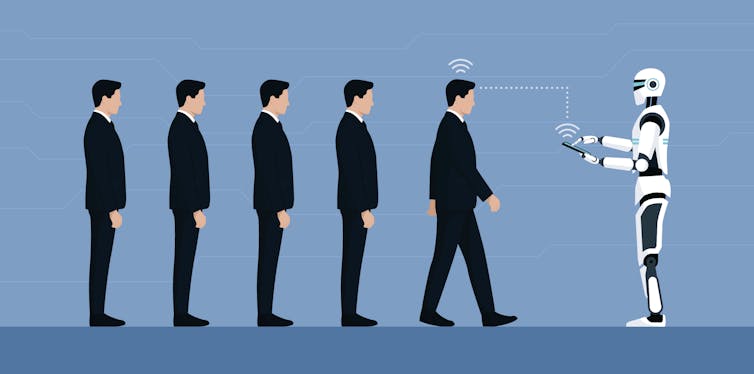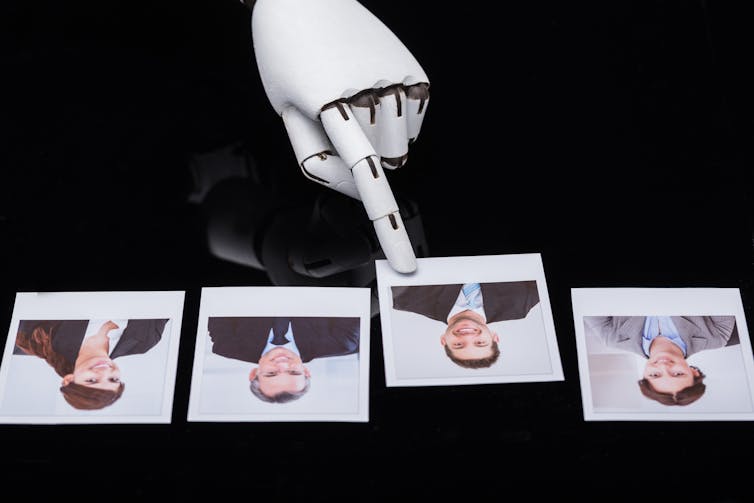Oh my! Twice within one week! I had a favourite meal — turkey and the trimmings! Canadian Thanksgiving is now a memory. Normally I and a number of others would get together for our Thanksgiving feast of turkey, ham, veggies and salads. Of course there would also have been the obligatory pumpkin pie. But alas, COVID-19 put that off until next year at the earliest. Instead, I ordered a turkey dinner with all the trimmings from my favourite restaurant and ate at home. It was sooooooooooooooo good! I also treated my 3 fur babes to fresh roasted chicken which they scarfed up like Hoover uprights! While we were scarfing, the news did not stop. I am taking a course in Indigenous Studies from the University of Alberta online and I am also taking a course on racism based on Ibram Xendi’s book “How to be an Anti Racist” through my church. It has been a busy week of studying and will continue to be until mid November.
CNN — “The unmasking is a massive — it’s a massive thing,” Trump said shortly after the release of the names. “It’s — I just got a list. It’s — who can believe a thing like this? And I watched Biden yesterday on ‘Good Morning America’ being interviewed by one of your colleagues, George Stephanopoulos, and he said he knew nothing about anything. He has no idea. He knows nothing about anything.” …
So important to Trump was this unmasking news that Attorney General William Barr tasked John Bash, the US Attorney in San Antonio, in late May with conducting an investigation into whether the unmasking was politically motivated.
That investigation has ended, according to The Washington Post. And it has ended without any charges being brought against Biden or any other Obama administration official. Or even any public report of its findings. …
There’s a pattern here, of course. From his initial insistence that 3 to 5 million people voted illegally in the 2016 election (for which he has provided zero evidence) right through these unmasking claims, Trump has desperately seized onto anything and everything that would suggest that not only did the so-called “deep state” work to keep him from winning but it has also done everything it can to hamstring his presidency. …
Remember how Trump repeatedly raised questions about whether Russia sought to interfere in the 2016 election to help him and hurt Hillary Clinton? Well, the intelligence community, special counsel Robert Mueller and the US Senate Intelligence Committee all said that that’s exactly what happened.
Or how Trump said that the entire Russia investigation was politically motivated by people out to get him? It wasn’t.
Or how Trump said that President Barack Obama and Biden had “spied” on his presidential campaign? Also, debunked.
Or how the DNC email server was somehow in the possession of the Ukrainians? It isn’t.
Or how Google and social media sites are biased against conservatives? Not quite.
The more recent events have led Trump to be extremely unhappy with AG Barr because he did not do Trump’s bidding to Trump’s satisfaction. In a comment within the past few days, Trump was asked if Barr would be his AG pick for a second term should he win. Trump would only say he was not happy. With Trump it is one thing after another, one scandal after another, conspiracy theory after conspiracy theory after another. Trump is a walking case of paranoid delusions and a national security risk.
Canadian Press — She’s accurately predicted the Brexit vote, the 2016 American presidential outcome, and last year’s federal election in Canada.
Now, a Canadian-made artificial intelligence system called Polly is forecasting next month’s U.S. presidential election, using public social-media data and algorithms.
Polly is profiled in the new documentary “Margin of Error,” which premieres Saturday on Ontario’s publicly funded network TVO, and across Canada on tvo.org and the station’s YouTube channel. …
The predictions currently update daily and have a high margin of error that will become smaller closer to the Nov. 3 election, but as of Wednesday afternoon, she had Democratic presidential nominee Joe Biden with 346 Electoral College votes vs. U.S. President Donald Trump at 192.
Polly also had Biden with 55 per cent of the popular vote vs. Trump at 45 per cent.
“But of course the huge caveat in that, particularly in the U.S., is issues of voter turnout, vote suppression, early voting and discounted ballots,” …
Definitely check out the interactive map at https://advancedsymbolics.com/us-election/. I don’t know about you, but I like Joe Biden’s numbers there. Of course there are many factors involved, but if previous uses are any indication, Polly may have star status . . . assuming nobody screws with the algorithms, this just may a new and reliable tool. The article has more detail so I encourage you to read it.
AlterNet — President Donald Trump urged California Republicans to defy a state order to remove fake “official” ballot drop boxes after numerous top officials called them “illegal.”
State Attorney General Xavier Becerra and Secretary of State Alex Padilla on Monday issued an order to the California GOP and three county chapters requiring the removal of unofficial ballot drop boxes erected in front of locations like gyms, gun stores and churches that were falsely marked “official.”
Trump, however, urged the party to fight the order in court.
“You mean only Democrats are allowed to do this? But haven’t the Dems been doing this for years?” the president tweeted, drawing a dubious comparison between the boxes and the legal “ballot harvesting” efforts by Democrats that have drawn his ire. “See you in court. Fight hard Republicans!” …
“Screw you!” Rep. Devin Nunes, R-Calif., said in response to Newsom’s tweet, according to Politico. “You created the law, we’re going to ballot harvest.” …
The offices of the attorney general and secretary of state said in a cease-and-desist order to the GOP that the law required “persons to whom a voter entrusts their ballot to return to county election officials provide their name, signature and relationship to the voter.”
Becerra and Padilla also argued during a Monday conference call that the boxes were “illegal,” because they were designed to trick voters by claiming to be “official.” The boxes lack the security requirements mandated for official collection boxes installed by election officials, they added.
Just like a Republican to twist and obfuscate well intentioned laws. I have not read the actual California law, but as Bill Maher says, “I just know it’s true.” Trump has encouraged North Carolinian Republicans to vote twice, once by mail and once in person. I hear the same has been conveyed to Trump supporters in Florida. Now over and above all the other Trump bullshit, he is encouraging voters and the Republican party to break the law . End the madness and DUMP TRUMP and as many Republicans as possible.
The Atlantic — The most important ballot question in 2020 is not Joe Biden versus Donald Trump, or Democrat versus Republican. The most important question is: Will Trump get away with his corruption—will his crooked and authoritarian tactics succeed?
If the answer is yes, be ready for more. Much more.
Americans have lavished enormous powers on the presidency. They have also sought to bind those powers by law. Yet the Founders of the republic understood that law alone could never eliminate the risks inherent in the power of the presidency. They worried ceaselessly about the prospect of a truly bad man in the office—a Caesar or a Cromwell, as Alexander Hamilton fretted in “Federalist No. 21.” They built restraints: a complicated system for choosing the president, a Congress to constrain him, impeachment to remove him. Their solutions worked for two and a half centuries. In our time, the system failed.
Through the Trump years, institutions have failed again and again to check corruption, abuse of power, and even pro-Trump violence.
As Trump took office, I published a cover story in this magazine, arguing that his presidency could put the United States on the road to autocracy. “By all early indications,” I wrote, “the Trump presidency will corrode public integrity and the rule of law—and also do untold damage to American global leadership, the Western alliance, and democratic norms around the world. The damage has already begun, and it will not be soon or easily undone. Yet exactly how much damage is allowed to be done is an open question.”
We can now measure the damage done. As we near the 2020 vote, the Trump administration is attempting to cripple the Postal Service to alter the election’s outcome. The president has successfully refused to comply with subpoenas from congressional committees chaired by members of the opposing party. He has ignored ethics guidelines, junked rules on security clearances, and shut down two counterintelligence investigations of his Russian business links, one by the FBI, the other by Special Counsel Robert Mueller. He has assigned prison police and park police to new missions as street enforcers, bypassing the National Guard and the FBI. As in 2016, he is once again welcoming Russian help for his election campaign—only this time, he controls the agencies that are refusing to answer the questions of Congress and the American people.
Those who would minimize the threat that Trump poses take solace in his personal weaknesses: his laziness, his ignorance of the mechanics of government. But the president is not acting alone. The Republican politicians who normally might have been expected to restrain Trump are instead enabling and empowering him. …
…Trump has normalized the minority rule. …
Republicans in the Trump years have gotten used to competing under rules biased in their favor. They have come to fear that unless the rules favor them, they will lose. And so they have learned to think of biased rules as necessary, proper, and just—and to view any effort to correct those rules as a direct attack on their survival. …
To understand how the U.S. system failed in Trump’s first term—and how it could fail further across another four years—let’s look closer at some of Trump’s abuses and the direction they could trend in a second term. …
Inciting Political Violence
Trump has used violence as a political resource since he first declared his candidacy, in the summer of 2015. But as his reelection prospects have dimmed in 2020, political violence has become central to Trump’s message. He wants more of it. After video circulated that appeared to show Kyle Rittenhouse shooting and killing two people and wounding a third in Kenosha, Wisconsin, on August 25, Trump liked a tweet declaring that “Kyle Rittenhouse is a good example of why I decided to vote for Trump.” “The more chaos and anarchy and vandalism and violence reigns, the better it is for the very clear choice on who’s best on public safety and law and order,” Trump’s adviser Kellyanne Conway said on Fox & Friends on August 27. Two nights later, a 600-vehicle caravan of Trump supporters headed into downtown Portland, Oregon, firing paintball guns and pepper spray, driving toward a confrontation during which one of them was shot dead. …
Trump’s appeal is founded on a racial consciousness and a racial resentment that have stimulated white racist terrorism in the United States and the world, from the New Zealand mosque slaughter (whose perpetrator invoked Trump) to the Pittsburgh synagogue murders to mass shootings in El Paso, Texas, and Gilroy, California. In recent weeks, political violence has caused those deaths in Kenosha and Portland. A second Trump term will only incite more such horror. …
Trump uses power to enrich himself and weaken any institution of law or ethics that gets in the way of his self-enrichment. He holds power by inflaming resentments and hatreds. A second term will mean more stealing, more institution-wrecking, more incitement of bigotry. …
Voters in 2020 will go to the polls in the midst of a terrible economic recession, with millions out of work because of Trump’s mishandling of the coronavirus pandemic. But the country is facing a democratic recession too, a from-the-top squeeze on the freedom of ordinary people to influence their government. Will the president follow laws or ignore them? Will public money be used for public purposes—or be redirected to profit Trump and his cronies? Will elections be run fairly—or be manipulated by the president’s party to prevent opposing votes from being cast and counted? Will majority rule remain the American way? Or will minority rule become not a freak event but an enduring habit? These questions are on the ballot as Americans go into the voting booth.
Although the article is long, to me it is “a call to arms” to VOTE and to vote wisely taking into account Trump’s and Republican corruption. Author David Frum, usually considered right of centre, also covers Trump’s Abuse of the Pardon Power, his Abuse of Government Resources for Personal Gain, and Directing Public Funds to Himself and His Companies. Americans cannot afford to let this mad man take the country hostage for another four years!
Vote Blue No Matter Who Top to Bottom!!!













